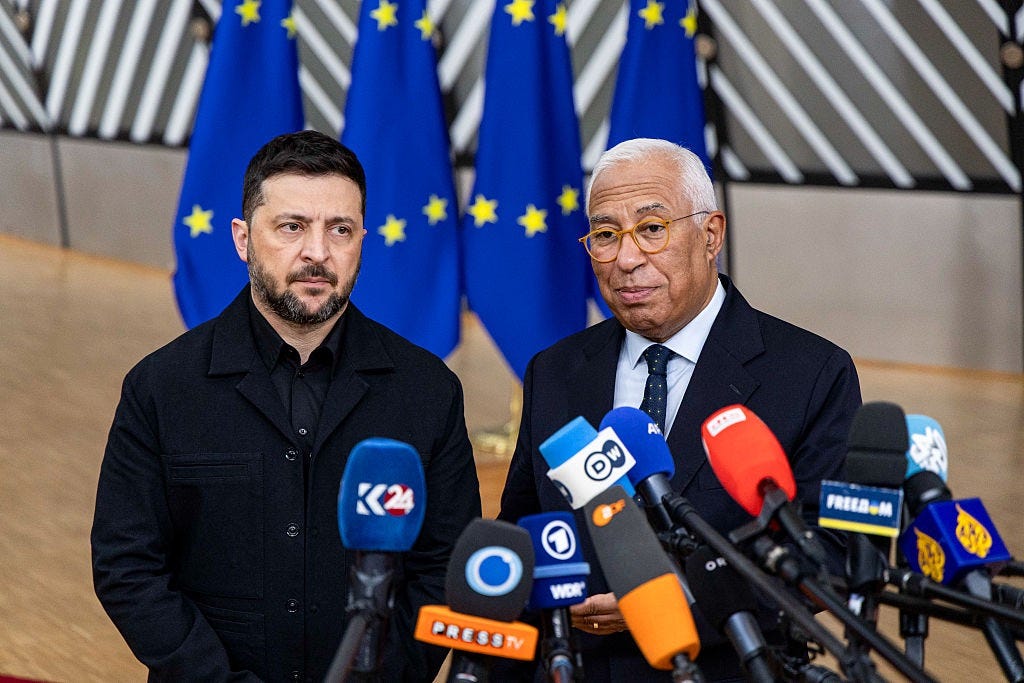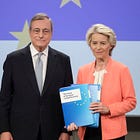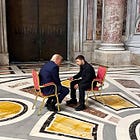
This article is brought to you by American Purpose, the magazine and community founded by Francis Fukuyama in 2020, which is proudly part of the Persuasion family.
It is too easy to succumb to despair about Europe’s future, as the Ukraine war continues and the continent faces two unfriendly global superpowers, China and the United States. The EU, built in more idealistic times, is adapting at a glacial pace to the new reality. Besides the bloc’s notorious incrementalism, European governments face a myriad of internal challenges, including slow economic growth, poor demographics, and increasingly unhinged domestic politics.
Yet there are green shoots of optimism—particularly in the EU’s continued commitment to Ukraine. At its recent meeting, the European Council adopted its 19th package of sanctions against Russia, targeting Russia’s shadow fleet, several Chinese companies involved in oil trade with Russia, as well as companies helping Russia circumvent the sanctions. Just the night before, the U.S. Treasury surprised some with its own sanctions imposed on Rosneft and Lukoil—the first update to U.S. sanctions policy against Russia since Donald Trump’s arrival in the Oval Office.
This is not the first seemingly big swing in U.S.-Ukraine policy. In late September, Trump claimed Ukraine could retake its full territory and hinted at transferring Tomahawk missiles to Ukraine. The White House meeting with Volodymyr Zelenskyy in mid-October, which Ukrainians hoped would finalize the deal, saw the plan scrapped. Of course, the encounter came just a day after a lengthy call between Trump and Vladimir Putin, following which preparations began for the now-aborted summit between Trump and Putin in Budapest, Hungary.
Throughout this wild cycle, Europeans stayed the course. The coalescing of European leaders behind Ukraine after the meeting in the Oval Office was instantaneous, accompanied by a 12-point peace plan endorsed by Zelenskyy. With an administration that seems internally divided on how to deal with the war, a united European front remains the best strategy to demand some putative bargain with the Kremlin that would then be imposed by Trump on Ukrainians and Europeans.
The EU can do more. In particular, it has come very close to leading the way in its push to use frozen Russian sovereign assets, as well as some privately held ones, to fund a major package of aid to Ukraine, worth up to €140 billion. The move should have come earlier and there are still major wrinkles to be ironed out—especially for Belgium, where most of the Russian assets are kept, and thus may be liable to a Russian legal challenge. Yet, the fact that the EU contemplates leveraging these assets directly is a far cry from the earlier tinkering around by taxing their windfall profits.
The progress, however slow, would not only be impressive in its own right. It would also be an act of defiance against the ongoing U.S. obstruction within G7 of multilateral plans to seize the assets—a solution that would present fewer risks to the EU’s financial stability than acting alone.
But Europe’s gradual awakening from its stupor must extend beyond the effort to ensure Ukraine prevails in its fight for survival and a European future. One area that offers promise is attracting global talent and turning the EU into a real hub for research and innovation—just as the United States seems to take an increasingly hostile approach toward both migrants and academic freedom. The EU’s “Choose Europe for Science” program, backed by over €500 million, could make a significant difference in recruiting scientists from U.S. universities and research institutions rattled by the administration’s overweening higher education policies and cuts to research funding. This is complemented by smaller schemes deployed by countries such as Austria or even by individual universities.
One challenge, of course, is that the gap between U.S. and European universities is sizeable, both in terms of resources and in terms of culture. Relocation grants must go hand in hand with policies that will offer U.S. academics competitive salaries and an environment that rewards excellent work rather than favoring insiders.
It is also incumbent on the EU to keep the cause of free trade alive in the absence of U.S. leadership—a task at which the bloc could do much, much better. The WTO system might well be dead, but that should not stop Europeans from concluding their trade agreements with South American “Mercosur” bloc countries and India, nor from finishing accession negotiations with Ukraine, Moldova, and Albania. The larger the EU’s single market and the better integrated it is with other major economies of the world, the more likely it will eventually serve as an anchor to rebuild the international trading system.
While the EU struggles to become a beacon of economic openness due to special interests, from Polish farmers to French unions, it also continues to labor under illusions in making fundamental choices about its own security. Although the ongoing increases in defense spending are welcome, it would be a grave mistake for European governments to treat additional spending on defense as a program for U.S. jobs or trade deficit reduction by buying exclusively U.S.-manufactured weapons systems. In many cases, there may not be good alternatives to U.S.-made equipment, but no one should be operating under the assumption, as many seem to today, that buying American weapons will make President Trump look more sympathetically at the alliance.
What the example of Ukraine demonstrates is that for European countries to bear the brunt of conventional deterrence in Eastern Europe and to project power elsewhere, they need to focus on building a vibrant and scalable industrial base at home, rather than buying expensive U.S.-made systems.
The Czech Republic, Romania, Greece, and Germany, among others, have placed orders for U.S.-made F-35 jets, at a total cost of tens of millions. Not only have such governments eschewed more economical European alternatives but they will also see their planes delivered only in the early-to-mid 2030s—hardly a smart move in the current volatile environment.
Moreover, to imagine that such purchases—coming inevitably at the cost of more immediate investments in defense capabilities—will somehow make President Trump more committed to NATO is delusional. The European Commission made a version of that mistake this year by accepting a humiliating, one-sided trade “deal” that imposed tariffs on European exports to America in exchange for tariff-free access of U.S. goods to the EU market—in addition to pledges of additional European investment in the United States and purchases of American commodities. The Commission’s rationale, hardly corroborated by current experience, was that playing softball on trade would ensure that the U.S. administration would remain attuned to Europe’s interests.
Counterintuitively, what the Trump administration has responded well to is not necessarily flattery or bribes, but rather credible displays of force. Just as President Trump seems to respect Xi’s defiance of the administration’s trade policies, he may be coming to begrudgingly recognize European leaders as more than just a collection of hapless weaklings whom he can bully. Europeans would do well to show consistency, including in defense of their economic interests.
Recognizing the new realities in Washington is different from setting in motion a transatlantic divorce. Quite the contrary, Europeans making their own choices, irrespective of what President Trump might want, is the first step toward putting the relationship on a more stable footing—and eventually will provide a basis for its reconstruction under more thoughtful political leadership in Washington.
Dalibor Rohac is a senior fellow at the American Enterprise Institute in Washington, D.C.
Follow Persuasion on Twitter, LinkedIn, and YouTube to keep up with our latest articles, podcasts, and events, as well as updates from excellent writers across our network.
And, to receive pieces like this in your inbox and support our work, subscribe below:






While I agree in principle, I also think that the world has gotten far too interconnected for any one group of nations to have to preserve and protect democracy on their own. Perhaps Trump’s deviations from the last 80 years of NATO have been a necessary motivating factor for Europe, as indeed other of his deviations has motivated Americans to take a much more serious look at how democracy ought to operate and how fragile a system it is. But we will not save ourselves from the Putins and Xis and Orbans and their ilk without concerted, coordinated efforts.